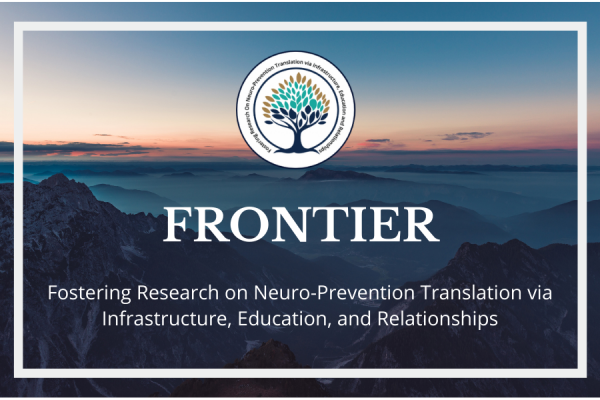
FRONTIER launches with focus on neuro-prevention
With the 2021 launch of FRONTIER at UNC Frank Porter Graham Child Development Institute (FPG), founder and director Diana Fishbein, PhD, is furthering her mission of mitigating the impacts of adversity and promoting healthy development for children and adolescents. FRONTIER (Fostering Research on Neuro-Prevention via Infrastructure, Education and Relationships) offers infrastructure for basic science researchers to collaborate with intervention and implementation specialists to better understand and prevent conditions that lead to negative developmental trajectories.
Fishbein says that “neuro-prevention” is a new model that applies technologies and knowledge from neuroscience to shed light on why some individuals or subgroups do not respond favorably to interventions currently available. Since FRONTIER is primarily interested in behavioral and mental health outcomes, affiliated researchers are committed to preventing young people from developing problems such as substance dependence and related disorders, violent behavior, academic failure, and mood disorders. The focus of their work is largely on children and adolescents who have experienced significant adversity, such as maltreatment, poverty, racism, inequities, violence, and/or substandard housing conditions. To this end, Fishbein and her colleagues want to identify best practices to promote a developmental trajectory that leads to health and well-being in adulthood, even in the face of adversity.
By identifying underlying generators of negative outcomes and ways in which they interact with the environment to affect children’s brain development, FRONTIER researchers, according to Fishbein, are able to determine how best to intervene with program components that specifically, precisely, and effectively target those generators. Fishbein says that this approach enables investigators to guide refinements in existing interventions and develop new, more novel interventions that work better than existing standards of care.
Recognizing the importance of interconnections between the social, behavioral, psychological and neurosciences, FRONTIER researchers use an integrated model in their research. “I’m particularly interested in psychosocial interventions, as opposed to pharmaceutical interventions, to nurture healthy development and help children thrive,” says Fishbein. “FRONTIER brings in collaborators from all of these different disciplines to work together and develop these more integrative approaches to improve child development.”
FRONTIER utilizes a six-stage translational prevention model, designed by Fishbein and colleagues, to facilitate sharing and the utility of scientific information across disciplines. The model begins with conducting basic science to identify novel targets for intervention. This stage is followed by applying the basic science to the development of program components that focus on those targets. The third stage involves efficacy and effectiveness trials that determine the extent to which the intervention is moving the needle on the phenomena that researchers are trying to prevent, with the goal of being as precise as possible.
Once the team has an intervention that works for modest- to large-size groups in the population of interest, researchers implement that intervention in real-world settings, such as schools, communities, and clinics. After compiling a clear body of knowledge about interventions and practices that consistently improve child development, investigators turn to policy reform. The goal here is to inform public health policies and public opinion so that prevention can be embedded in the public mindset, societal systems, and policies. Fishbein says that it is at this point when she expects the work to yield population-level benefits.
“My aspiration is to mobilize this knowledge so that we can “normalize prevention,” in other words, create a culture of prevention,” she says. “That means applying the principles, practices, and kernels demonstrated by the science to support healthy development into our daily activities because we understand how valuable every interaction is to every child.”
Fishbein collaborates closely with FPG’s policy division to ensure that prevention science findings are communicated to state and federal policymakers. FPG does not lobby but instead provides research findings and policy recommendations on issues such as measures to improve early child care and education, prevent trauma, and divert children from the juvenile justice systems.
Fishbein invites collaborators to reach out to her, saying “I’d like for investigators to be aware of the research FRONTIER is conducting and how it can support collaborations across disciplines to address important social issues.”
